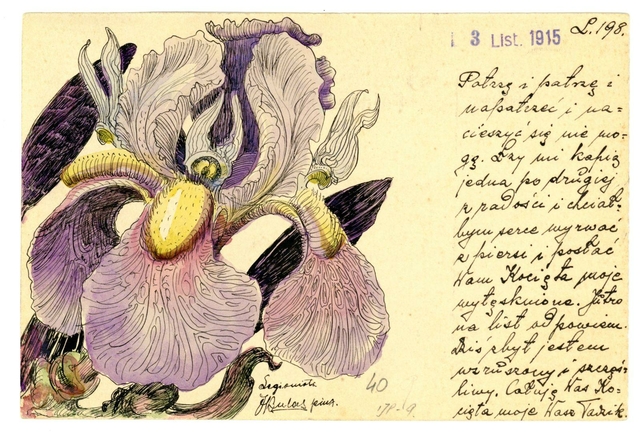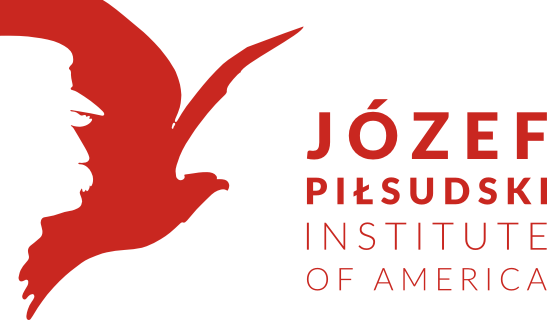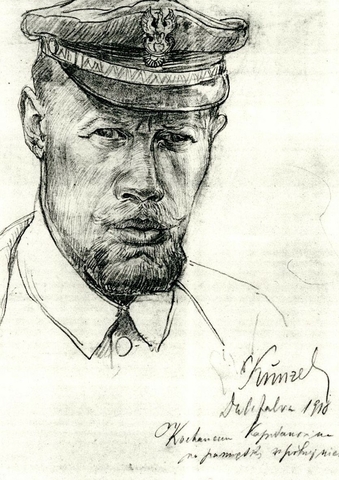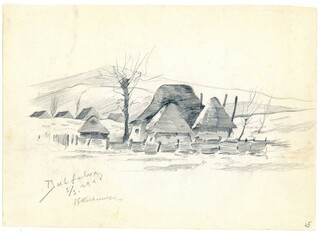The Polish Legions, formed in August 1914, are inseparably associated with Józef Piłsudski and other notable commanders such as as Kazimierz Sosnkowski, Józef Haller, Bolesław Roja, and Zygmunt Zieliński. However, the Legions were not just those famous names, but also less well-known soldiers who, through their actions, contributed equally honorably to our homeland. Memorabilia from some of the soldiers are part of the Institute’s collection.
 Postal card written by captain Tadeusz Terlecki to his family
Postal card written by captain Tadeusz Terlecki to his family
The collection of Captain Tadeusz Terlecki, a soldier of the Polish Legions, was donated to the Institute in 1989 by Maria Ustrzycka-Sikorska. Beautiful and moving postcards written by Captain Terlecki from the Legions to his wife (Helena Sikorska) and children are part of the collection. As Captain Terlecki wrote, there was no letter paper in the Legions, so his military colleague, Jan Burlas, decorated plain paper with picturesque plant motifs - sketches of flowering holly, thyme, and iris. Interestingly, a portrait of Captain Terlecki himself by one of his fellow soldiers has also been preserved.
Born in Lviv in 1886, Tadeusz Terlecki, was a high school professor. Even before the outbreak of World War I, he became involved in the fight for Poland’s independence. In 1913, Terlecki served in the Lviv Division of Związek Strzelecki. The experience proved useful later, after the outbreak of World War I, when Terlecki commanded the 2nd Infantry Regiment in the newly formed Polish Legions.
Fascinated by Józef Piłsudski, Terlecki called him the ideological leader of the Brigade. When it was still uncertain that Poland would regain its independence after the war, Terlecki tried to maintain fighting spirit among his soldiers. His appeals to the soldiers were filled with unwavering faith in independent Poland. With time, due to poor health, he was transferred to the so-called rear service. Stationed in Lviv, Terlecki was responsible for the military logistics.
In February 1918, Captain Terlecki participated in the Polish Legions’ actions near Rarańcza, later on described as the crucial moment in history of the Legions. It was a moment of declaring the Legions’ disobedience to Austria. Although the military action was successful and part of the II Brigade led by J. Haller managed to cross the front line to the Russian side, Terlecki was captured and interned in the Dulfava camp (now a village in Ukraine). Sketches of the officers' camp and the village drawn at that time are also available in the collection (Collection of Captain Tadeusz Terlecki).
Unfortunately, Captain Terlecki's story does not have a happy ending. After internment in the spring of 1918, still serving under the Austrian command, Terlecki was sent to the Italian front. The Legions fought in very difficult conditions in the Alps and Dolomites, and later in the Venetian Plains. Terlecki became ill and died of malaria.
Thanks to sacrifice of people like capitan Tadeusz Terlecki today Poland is free and independent country.
The project was supported by:












